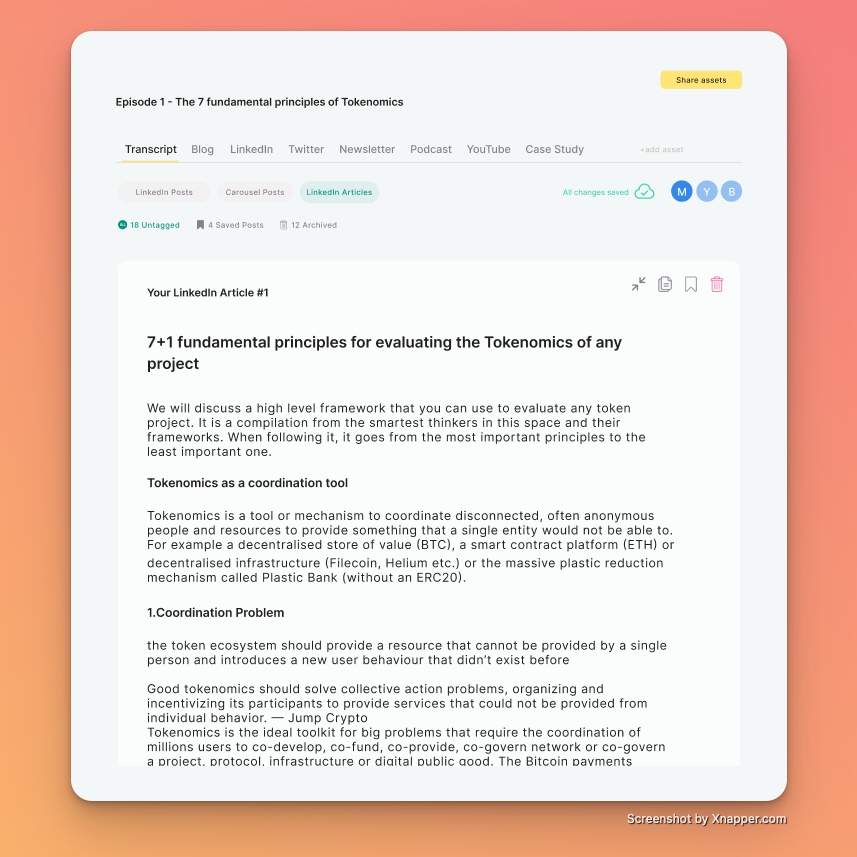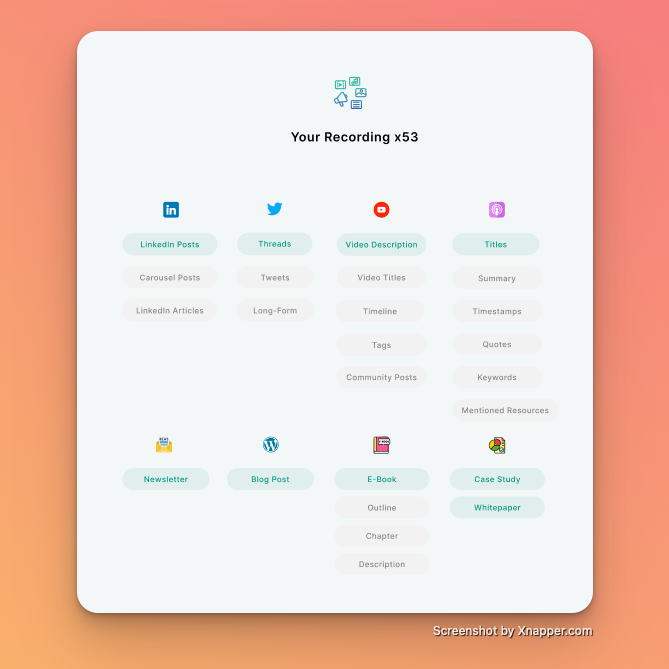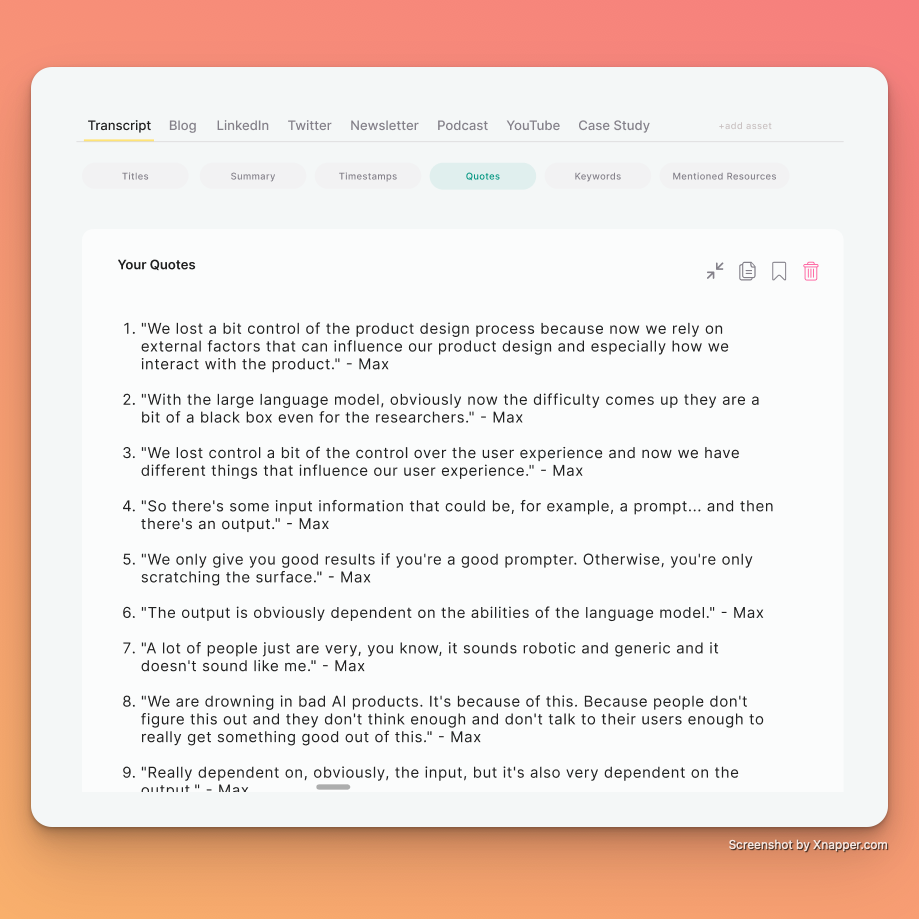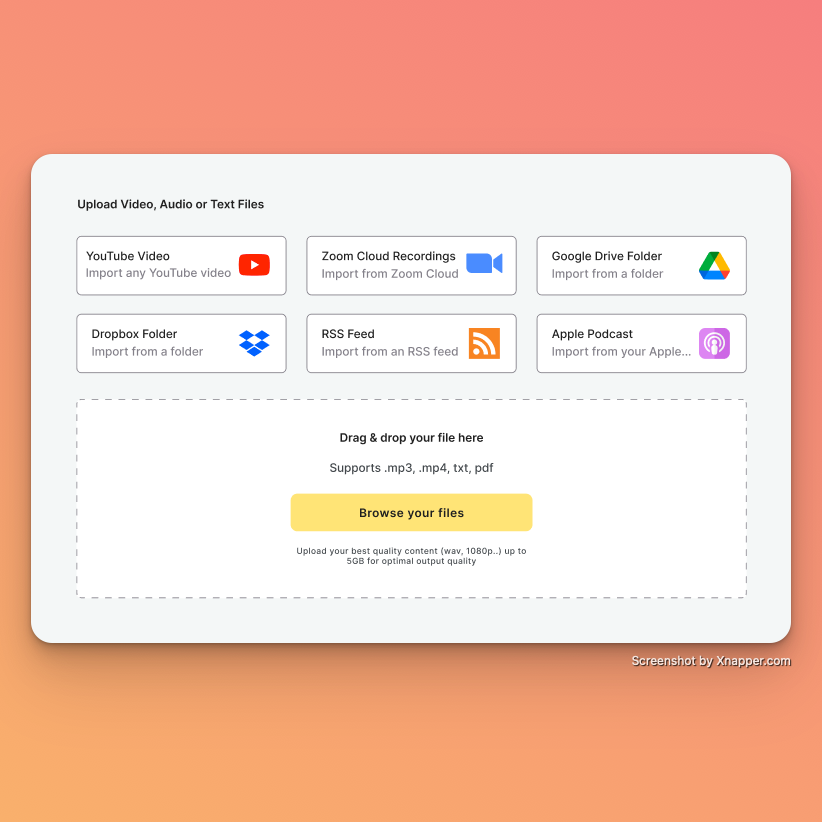Mythology Podcast Name Ideas
100 Mythology Podcast Name Ideas
Framework 1: Niche-Specific Keywords
Steps:
1. Identify the core subject of your channel (e.g., Greek Mythology, Norse Mythology, Egyptian Mythology).
2. List relevant keywords related to the subject.
3. Combine keywords to create a clear and descriptive name.
Examples:
– Greek Mythology + Legends = Greek Legends
– Norse Mythology + Tales = Norse Tales
– Egyptian Mythology + Secrets = Egyptian Secrets
– Mythology + Chronicles = Mythology Chronicles
– Mythology + Lore = Mythology Lore
Framework 2: Unique Value Proposition
Steps:
1. Determine what unique aspect your channel offers (e.g., In-depth Analysis, Modern Interpretations, Mythological Connections).
2. Think of words that describe this unique value.
3. Combine these descriptive words with your subject matter.
Examples:
– In-depth Analysis + Mythology = Mythology Deep Dive
– Modern Interpretations + Mythology = Modern Mythology
– Mythological Connections + Stories = Connected Myths
– Historical Insights + Mythology = Myth History
– Comparative Studies + Myths = Myth Comparative
Framework 3: Audience-Focused Naming
Steps:
1. Identify your target audience (e.g., Mythology Enthusiasts, History Buffs, Story Lovers).
2. List the goals or challenges of your audience (e.g., Learning, Entertainment, Discoveries).
3. Combine these elements into a name that speaks directly to your audience.
Examples:
– Mythology Enthusiasts + Learning = Myth Learners
– History Buffs + Discoveries = History of Myths
– Story Lovers + Entertainment = Myth Storytime
– Curious Minds + Exploration = Myth Explorers
– Culture Seekers + Insights = Myth Cultures
Framework 4: Creative and Catchy
Steps:
1. Brainstorm fun and catchy words related to your niche.
2. Think about phrases or combinations that are easy to remember.
3. Mix and match words until you find a combination that stands out.
Examples:
– Mythical + Musin’ = Myth Musin’
– Legendary + Lore = Legendary Lore
– Fabled + Facts = Fabled Facts
– Epic + Echoes = Epic Echoes
– Myth + Mysteries = Myth Mysteries
Framework 5: Authority and Expertise
Steps:
1. Identify words that convey authority and expertise (e.g., Scholar, Expert, Master).
2. Combine these words with your subject matter to create a name that suggests professionalism.
3. Ensure the name reflects the credibility of your content.
Examples:
– Mythology + Scholar = Mythology Scholar
– Myth + Expert = Myth Expert
– Legends + Master = Master of Legends
– Myth + Authority = Myth Authority
– Mythology + Guru = Mythology Guru
Framework 1: Word Play and Puns
Use clever wordplay, puns, or alliteration to create a fun and memorable channel name. This approach can make your channel name catchy and engaging.
Steps:
1. Identify key themes or subjects of your channel (e.g., Mythology, Legends, Gods).
2. Brainstorm puns or playful phrases related to these themes.
3. Combine words creatively to make the name fun and memorable.
Examples:
– Mythology + Myth = Mythical Musingss
– Legends + Lore = Legendary Lore
– Gods + Gabs = Deity Discussions
– Myth + Magic = Mythic Magic
– Legends + Laughs = Laughable Legends
Framework 2: Problem-Solution Naming
Focus on the problem your channel solves or the benefit it provides. This approach makes it clear to viewers what they can expect from your channel.
Steps:
1. Identify common problems or challenges your audience faces (e.g., Understanding Myths, Learning History, Knowing Characters).
2. Highlight the solution or benefit your channel offers.
3. Combine these elements into a name that addresses the problem and solution.
Examples:
– Understanding Myths + Clarity = Myth Unraveled
– Learning History + Stories = Mythic Histories
– Knowing Characters + Insight = Gods Demystified
– Understanding Myths + Fun = Myth Made Easy
– Learning History + Enjoyable = Legends Explained
Framework 3: Descriptive and Direct
Use straightforward and descriptive words to clearly communicate the channel’s focus. This makes it easy for viewers to understand what your channel is about at a glance.
Steps:
1. Identify the main focus or subject of your channel (e.g., Myths, Legends, Deities).
2. Use direct and descriptive words related to this focus.
3. Combine these words to create a clear and informative name.
Examples:
– Myths + Stories = Myth Storytime
– Legends + Tales = Legendary Tales
– Deities + Discussions = Deity Talks
– Myths + Explanations = Myth Explanations
– Legends + Lessons = Legend Lessons
Framework 4: Personal Branding
Incorporate your name or a personal brand element into the channel name to create a personal connection with your audience. This can make your channel feel more approachable and unique.
Steps:
1. Decide if you want to use your name, nickname, or a brand element (e.g., Alex, Myth Lover, Mythos).
2. Think of ways to combine this personal element with your channel’s focus.
3. Create a name that feels personal and relatable.
Examples:
– Alex + Myths = Alex’s Mythical Journey
– Myth Lover + Legends = Myth Lover’s Legends
– Mythos + Tales = Mythos Tales
– Alex + Deities = Alex & The Gods
– Myth Lover + Stories = Myth Lover’s Stories
Framework 5: Inspirational and Motivational
Use words that inspire or motivate your audience. This approach can create a positive and uplifting association with your channel.
Steps:
1. Identify the inspirational or motivational themes related to your content (e.g., Wisdom, Heroism, Enlightenment).
2. Choose words that evoke these themes.
3. Combine these words to create an uplifting and inspiring name.
Examples:
– Wisdom + Myths = Mythic Wisdom
– Heroism + Legends = Heroic Legends
– Enlightenment + Deities = Deity Enlightenment
– Inspiration + Myths = Inspiring Myths
– Bravery + Tales = Brave Tales
Framework 1: Acronyms and Abbreviations
Use acronyms or abbreviations to create a concise and memorable channel name. This can make the name easy to remember and quick to type.
Steps:
1. Identify key phrases or terms related to your channel (e.g., Mythology Tales, Ancient Legends, Divine Stories).
2. Create acronyms or abbreviations from these phrases.
3. Ensure the acronym or abbreviation is easy to pronounce and remember.
Examples:
– Mythology Tales = MTales
– Ancient Legends = A-Legends
– Divine Stories = DStories
– Mythical Narratives = MNarratives
– Gods and Myths = GMyths
Framework 2: Trendy and Modern
Incorporate trendy or modern terms and slang to appeal to a contemporary audience. This approach can make your channel seem current and relevant.
Steps:
1. Identify modern terms, slang, or trends related to your niche (e.g., MythBuzz, LegendVibes, MythologyNow).
2. Combine these trendy terms with relevant keywords.
3. Ensure the name resonates with current trends and is easy to understand.
Examples:
– MythBuzz + Legends = MythBuzz Legends
– LegendVibes + Stories = LegendVibes Stories
– MythologyNow + Tales = MythologyNow Tales
– Epic + Myths = Epic Myths
– Viral + Legends = Viral Legends
Framework 3: Geographic and Local
Use geographic locations or local references to create a sense of community and relevance. This can be particularly effective if your content has a local focus.
Steps:
1. Identify relevant geographic locations or local terms (e.g., Greek Myths, Norse Legends, Celtic Tales).
2. Combine these locations with relevant keywords or subjects.
3. Ensure the name reflects the local or geographic focus.
Examples:
– Greek + Myths = Greek Myths Podcast
– Norse + Legends = Norse Legends Channel
– Celtic + Tales = Celtic Tales Radio
– Egyptian + Mythos = Egyptian Mythos Show
– Roman + Lore = Roman Lore Cast
Framework 4: Historical and Cultural References
Incorporate historical events, figures, or cultural references to give your channel a unique and interesting twist. This can appeal to viewers with specific interests in these areas.
Steps:
1. Identify historical events, figures, or cultural references related to your content (e.g., Zeus Chronicles, Ragnarok Stories, Arthurian Legends).
2. Combine these references with relevant keywords or subjects.
3. Ensure the name evokes the historical or cultural context.
Examples:
– Zeus + Chronicles = Zeus Chronicles
– Ragnarok + Stories = Ragnarok Stories
– Arthurian + Legends = Arthurian Legends Podcast
– Trojan + Tales = Trojan Tales Show
– Odin + Myths = Odin Myths Radio
Framework 5: Emotional Appeal
Use words that evoke strong emotions or feelings to create a deep connection with your audience. This approach can make your channel name more memorable and impactful.
Steps:
1. Identify emotions or feelings you want to evoke (e.g., Wonder, Awe, Mystery).
2. Choose words that are strongly associated with these emotions.
3. Combine these emotional words with relevant keywords or subjects.
Examples:
– Wonder + Myths = Wonder Myths
– Awe + Legends = Awe Legends
– Mystery + Tales = Mystery Tales
– Enchanted + Stories = Enchanted Stories
– Mythic + Emotions = Mythic Emotions
Framework 1: Questions and Curiosity
Use questions or phrases that evoke curiosity to engage potential viewers. This approach makes people want to find out more about your channel.
Steps:
1. Identify intriguing questions or curiosity-inducing phrases related to your content (e.g., What if?, Did You Know?, Who Were They?).
2. Combine these questions with relevant keywords or subjects.
3. Ensure the name piques curiosity and invites exploration.
Examples:
– What if? + Mythology = What If Mythology
– Did You Know? + Myths = Did You Know Myths
– Who Were They? + Gods = Who Were The Gods?
– Why + Legends = Why Legends?
– How + Folklores = How Folklores Began
Framework 2: Action-Oriented Names
Use action verbs to create a sense of dynamism and activity. This can make your channel name exciting and suggest active engagement.
Steps:
1. Identify action verbs related to your content (e.g., Discover, Explore, Uncover).
2. Combine these verbs with relevant keywords or subjects.
3. Ensure the name conveys energy and action.
Examples:
– Discover + Myths = Discover Myths
– Explore + Legends = Explore Legends
– Uncover + Deities = Uncover Deities
– Unearth + Folk Tales = Unearth Folk Tales
– Reveal + Mythos = Reveal Mythos
Framework 3: Playful and Fun
Use playful and fun words to create a lighthearted and enjoyable channel name. This approach can make your channel seem approachable and entertaining.
Steps:
1. Identify playful and fun words related to your niche (e.g., Mythical, Quirky, Enchanted).
2. Combine these words with relevant keywords or subjects.
3. Ensure the name is enjoyable and easy to remember.
Examples:
– Mythical + Musicals = Mythical Musicals
– Quirky + Quests = Quirky Quests
– Enchanted + Tales = Enchanted Tales
– Myth + Mania = Myth Mania
– Fabled + Fun = Fabled Fun
Framework 4: Hybrid Names
Combine two different concepts or words to create a unique and memorable name. This can set your channel apart with a distinctive and interesting identity.
Steps:
1. Identify two different concepts or words related to your content (e.g., Myth, Chronicles, Lore).
2. Combine these concepts to create a hybrid name.
3. Ensure the name is unique and reflects the essence of your channel.
Examples:
– Myth + Chronicles = Myth Chronicles
– Lore + Cast = LoreCast
– Saga + Sphere = SagaSphere
– Epic + Echoes = EpicEchoes
– Legend + Lore = LegendLore
Framework 5: Numbers and Lists
Use numbers or list-related terms to create a sense of structure and organization. This approach can make your channel seem informative and easy to follow.
Steps:
1. Identify key topics or themes in your content that can be numbered or listed (e.g., Gods, Heroes, Myths).
2. Combine these topics with numbers or list-related terms.
3. Ensure the name suggests clear, organized, and structured content.
Examples:
– 10 + Gods = 10 Gods
– 5 + Myths = 5 Myths
– Top 7 + Legends = Top 7 Legends
– Myth + Countdown = Myth Countdown
– 3 + Heroic Tales = 3 Heroic Tales
How to choose from the Mythology Podcast Name Ideas
Mythology Podcast Name Ideas should resonate with both the essence of ancient tales and the curiosity of modern listeners, blending uniqueness with clarity. First, identify central themes or deities from various mythologies—such as Norse, Greek, Egyptian, or Indian—that possess wide recognition or special interest. Names like “Echoes of Olympus” or “Valhalla Voices” invoke a sense of place and culture while sounding inviting and memorable. It’s important to consider alliteration and rhythm to make the name catchy; titles like “Mythic Musings” or “Saga Soiree” are easy to remember and pleasant on the ear. Including words that hint at storytelling, such as “Chronicles,” “Legends,” or “Saga,” can further emphasize the format and content of your podcast. Ensure that the name is not overly long to avoid complicating searchability and branding. Lastly, before settling on a name, do a thorough search to confirm that it’s original and not easily confused with existing podcasts or brands, as this will help establish a distinctive identity within the crowded podcasting world.
Using Mythology Podcast Name Ideas can significantly enhance your creative process, allowing you to focus on the content and storytelling rather than getting bogged down by the task of brainstorming names. This tool ensures that your podcast title is not only unique and captivating but also resonates deeply with your target audience, reflecting the rich and immersive themes of mythology. A well-chosen name can elevate your podcast’s brand, making it more memorable and easier to discover. Furthermore, with Mythology Podcast Name Ideas, you can save valuable time and energy, freeing you up to delve into research and production, ultimately delivering higher-quality episodes. An engaging, thematically relevant name can also boost your marketing efforts, attracting listeners who are passionate about mythological stories and eager for fresh, compelling content. Embrace the advantages of Mythology Podcast Name Ideas to make a lasting impression in the competitive podcasting arena.
Unifire is the most powerful AI Writer for Podcasters
Unifire combines a beautiful AI writer with the best transcription service and content templates for Podcast content. It allows you to easily autogenerate show notes, video descriptions, summaries and titles, extract quotes, and turn your podcasts into blog posts, newsletters and even e-books. Start with Mythology Podcast Name Ideas and level up with Unifire.ai
An ultra-powerful AI writer
Summarise, extend, shorten and whatever you can imagine with our powerful AI editor. You can work with your content with maximum efficiency and full collaboration.

32 different output formats
With Unifire, you can turn and repurpose anything into anything. One audio recording can become an e-book, 40 LinkedIn posts, an email newsletter, a lead magnet, or every Twitter asset with one click of a button.

Build for your entire team
Unifire comes with unlimited team members, workspaces, collaborative live editing and double backups for all your content.

Upload any formats you can imagine
You can feed Unifire audio recordings, videos, webinars, transcripts, documents and PDFs. Everything can be repurposed.



 العربية
العربية Čeština
Čeština Dansk
Dansk Nederlands
Nederlands English
English Suomi
Suomi Français
Français Deutsch
Deutsch Italiano
Italiano 日本語
日本語 한국어
한국어 Norsk bokmål
Norsk bokmål Polski
Polski Português
Português Русский
Русский Español
Español Svenska
Svenska